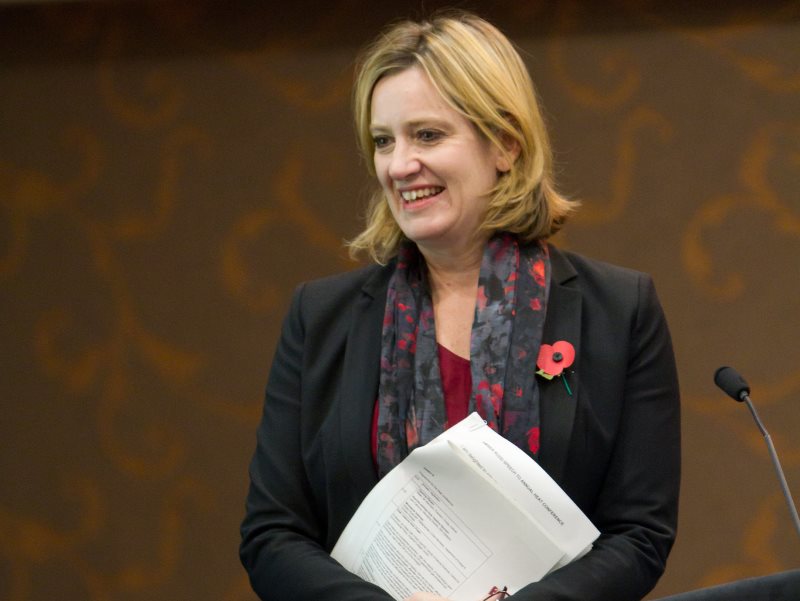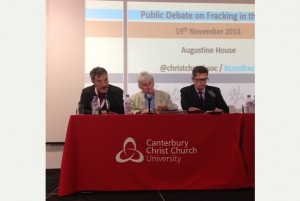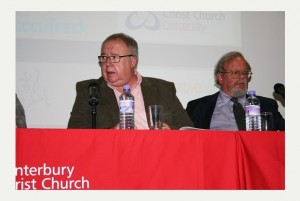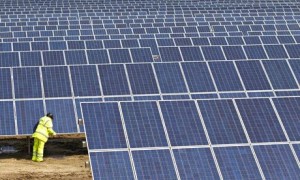Amber Rudd is the Fossil Fuel Energy Secritary!
Amber Rudd gives a new twist to David Cameron’s administration, outright support of fossil fuels! Amber Rudd has been misrepresenting our best interests for some time! She has, on several occasions, not told the truth to the people and to Parliament. This is proof that we can not trust our current government. We should request an investigation, criminal charges against Amber Rudd, and the end of Cameron’s government.
Here is the complete article from The Ecologist:
Leaked letter: Rudd admits 25% green energy undershoot, misled Parliament
Oliver Tickell 9th November 2015
A letter from Energy Secretary Amber Rudd leaked to The Ecologist shows that she misled Parliament by promising the UK was ‘on course’ to deliver on its renewable energy targets – when in fact there is a delivery shortfall in 2020 of almost 25%. Her plan to fill the gap relies on more biofuels, buying in green power and ‘credits’ from abroad – everything but wind and solar.

A letter from Energy Secretary Amber Rudd leaked to The Ecologist shows that the UK is on track to miss its legally binding obligation to achieve strict EU targets on renewable energy by an estimated 50TWh (terawatt hours), or 3.5% of its 15% obligation – that is a shortfall of almost 25%.
This stands in stark contrast to her public position. On 17th September she told the House of Commons: “When it became apparent that we were way in excess of [spending limits on renewables], but were still meeting our renewables targets, it was right to limit the amount of money we were spending.”
As Rudd warns, this impending failure to meet EU renewables targets puts the UK at a double risk – of legal action taken in the UK, which the government would probably lose; and of enormous fines imposed by the European Court of Justice:
“The absence of a credible plan to meet the target carries the risk of successful judicial review, and failing to meet the overall target in 2020 could lead to on-going fines imposed by the EU Court of Justice (which could take into account avoided costs) until the UK reaches the target level.”
But by misleading the House of Commons in her statement, she is now certain to have a more immediate problem on her hands – demands for her resignation and a full-blown Parliamentary investigation.
Her first test will come tomorrow before the Energy and Climate Change Committee tomorrow (Tuesday 10th November) when its members grill her on her department’s annual report and accounts.
Speaking in advance of the meeting, Labour’s shadow energy secretary Lisa Nandy said: “At the very same time the energy secretary is telling her colleagues in private we’re not on course to meet our legal target on clean energy, she is cutting wind and solar schemes that could help us to meet it. It beggars belief.”
The grisly detail of Rudd’s smoke-and-mirrors
The letter, to Cabinet colleagues Philip Hammond (Foreign Secretary), Oliver Letwin (Cabinet Office), Greg Hands (Chief Secretary to the Treasury) and Patrick McLoughlin (Transport Secretary) begins by setting out the scale of what the UK has to achieve:
“The target sets a legally binding obligation on HMG to deliver 15% of the UK’s final energy consumption across electricity, heat and transport from renewable sources in 2020, with a binding sub-target for 10% of transport fuels to be from renewable sources in 2020.
“Beyond a flat rate of renewables for each member state, the effort share for meeting the EU-wide 20% target was based on GDP. As a result of this, and the fact that the UK started from a very low base of renewables deployment, our target requires amongst the most significant annual growth in renewables deployment (16% average annual growth from 2011 to 2020) of any member state.”
And although the UK’s current trajectory is on course for a massive miss of 32-66 TWh (terawatt hours) per year by 2020, with a central estimate of a 50TWh shortfall, the UK’s public position is that there is no problem meeting the target.
Yet her public statements all indicate that everything is on track. As noted above, on 17th September she told the House of Commons: “We had a commitment to limit the levy control framework to £7.6 billion by 2020. When it became apparent that we were way in excess of that, but were still meeting our renewables targets, it was right to limit the amount of money we were spending. That is why we took action quickly to do so.”
A consistent pattern of concealing the truth
Or as she told Parliament on 22nd June 2015 – ironically in her statement termination subsidies for onshore wind: “This Government is committed to meeting objectives on cutting carbon emissions and to continue to make progress towards the UK’s 2020 renewable energy targets.
“The renewable electricity programme aims to deliver at least 30% of the UK’s electricity demand from renewables by 2020. We are on course to achieve this objective. Renewables already make up almost 20% of our electricity generation and there is a strong pipeline to deliver the rest.”
Note the subtle switch from ‘energy’ to ‘electricity’ in her second sentence. A DECC spokesman commented: “We do not comment on leaked documents. As the Secretary of State has set out clearly in the House, renewables made up almost 20% of our electricity generation in 2014 and there is a strong pipeline to deliver our ambition of reaching 30% by 2020. We continue to make progress to meet our overall renewable energy target.”
However Rudd had also told Parliament a few days before on 18th June, again in the context of the early closure of support for onshore wind, that deployment was set to deliver on the 2020 renewable energy targets: “The Government are committed to meeting objectives on cutting carbon emissions and the UK’s 2020 renewable energy targets …
“My Department’s analysis indicates that, after taking into account an early closure, onshore wind deployment under the RO [Renewables Obligation] will be in the region of 11.6 GW … this puts us above the middle of the range set out in the EMR [Electricity Market Reform] delivery plan, our best estimate of what we would need to meet our 2020 targets. It is therefore appropriate to curtail further deployment of onshore wind, balancing the interests of onshore wind developers with those of the wider public.”
The message is clear, in statement after statement, she told Parliament that everything was going to plan towards meeting renewable energy targets. But she sets out the truth in her leaked letter. Until 2017 / 2018 the UK will be achieving its milestones, she writes, but after that
“The trajectory then increases substantially, and currently leads to a shortfall against the target in 2020 of around 50 TWh (with a range of 32 – 67TWh) or 3.5% points (with a range of 2.1 – 4.5% points) in our internal central forecasts (which are not public). Publically we are clear that the UK continues to make progress to meet the target.”
The cuts that are destroying a once booming British industry
Since its election to power in May 2015, the Conservative government has unleashed an astonishing series of attacks on the UK’s renewable energy sector which has included:
The government’s claim is that this has been motivated by the need to save money allocated under the ‘Levy Control Framework’ which allocates funds for renewable energy, however the depth and extent of the cuts betrays a strong ideological agenda to destroy the UK renewables industry.
Following her re-election in May, Rudd promised: “I want to unleash a new solar revolution – we have a million people living under roofs with solar panels and that number needs to increase.” However in office she has done the precise reverse. This letter now shows the desperate position those cuts have put the UK into.
Rudd’s plan to meet target without new wind and solar
The first element in Rudd’s plan to meet the UK’s target is by “Maintaining and improving existing policy performance towards the target”, she writes. “This would require us:
- “to maintain our commitment to achieving at least 30% of electricity generation from renewables;
- “to meet the 10% sub-target for renewable fuels in transport;
- “and to continue support for the deployment of new renewable heating installations after the current funding settlement ends in 2015/16.”
Spot the lack of mention of anything to do with new wind and solar power? Her plan is based entirely on other means of achieving the target – even though wind is by far the lowest cost form of renewable energy, and solar is likely to become cheaper by 2020 with continued support to the point where it competes directly against fossil fuel generation.
The renewable heat incentive alone, Rudd writes, could deliver 20TWh (with a range of 15 – 32TWh), leaving a ‘central shortfall’ of around 30TWh. However she adds that “These forecasts are subject to significant uncertainty as the market for renewable heat is at an early stage and as a result of market and technical performance factors relating to renewable electricity.”
The next element is “Additional UK renewables deployment”, she writes. “Officials across Whitehall are reviewing policy options open to us to address this c.30TWh shortfall through additional deployment of renewables in heat, electricity and transport.”
Current levels of ‘renewable fuels’ derived from crops are already set to be doubled between 2017 and 2020, adding around 2 pence per litre on pump prices, but Rudd suggests that a further increase would be possible.
“An additional 12.9TWh or 0.9% points could theoretically be delivered above the sub target, at an estimated cost of £850m/year (adding a further 2.1 pence per litre on pump prices).”
But she warns that the move would be counter-productive in climate terms: “Due to limited availability of sustainable feedstocks, supply beyond the sub target appears likely to increase carbon emissions by increasing deforestation through new demand for agricultural land.”
There’s also potential to increase additional bio-methane production produced from organic wastes and some specially grown crops, however two thirds of the 6TWh this could produce have already been counted:
“The highest potential for additional renewable heat is from bio-methane injection into the gas grid, which could deliver up to 6TWh (or 0.4% points) by 2020. However a significant proportion of this (up to 4TWh) is already included in the proposals for continuing support for renewable heat post 2015/16.”
The ‘third way’ – buy it in from Norway
Rudd’s third step is certain to cause huge anger in the UK’s renewable energy industry as it involves simply buying it in from abroad, specifically from Norway’s hydroelectric dams. But it comes with one big problem – the required electrical connection to Norway won’t be ready on time:
“Additional deployment of electricity focuses on importing renewable electricity from Norway via the planned interconnector. This could deliver a maximum of 10TWh, depending on market forces. However, my officials do not expect the interconnector to be in operation until late 2021 at the earliest, and therefore would not strictly help the UK to reach its 2020 target.”
But that’s not the only problem: if the renewable power is generated in Norway then how can it be made to count as British just be importing it?
“Should this change, we believe that an intergovernmental agreement would be necessary, under which the UK would be required to make payment(s) to the Norwegian government (on top of that which would be paid for the electricity supplied through normal market mechanisms).”
Which is all very well, but it will cost the Uk money that should be going into our own renewables programme., Moreover there’s no guarantee that the arrangement would be considered valid by the European Commission or by the European Court.
So why not just buy in ‘statistical credits’ from other countries?
Nonetheless Rudd goers on to consider further “Use of co-operation mechanisms” that would allow the UK to finance renewable energy projects in other EU states.
Which raises the question: when the UK has Europe’s richest wind power resource, why would we want to do that? In the process exporting the jobs, expertise and industrial investment to other countries?
“In the absence of other measures to increase renewable energy consumption in the UK, a strategy to meet the target (and to ensure that the target is met in the most cost-effective way) would need to involve the UK purchasing renewables deployment later in the decade from other EU Member States which have over-achieved their target.
“There are two ways to do this The first would see HMG directly support a specific renewables project in another EU or European Economic Area Member State or third country, with an agreed proportion of the renewable energy generated being transmitted to the EU where the project occurs in a third country.”
And another problem then strikes: “However, at this stage there are no projects we have identified with the potential to deploy in the right time frames.” Which leads Rudd to attempt to invent a whole new market mechanism in ‘statistical credits’ for renewable energy from other EU countries.
“The alternative is to reach an agreement with an EU or EEA Member State, which is likely to over-achieve on its target, to buy ‘statistical credits’ from it in 2020. The market for such transactions does not yet exist, and there is a low likelihood that sufficient credits will be available to meet the total UK shortfall of 50TWh.”
Just one small problem there: there is currently no such thing as a ‘statistical credit’ that the Commission or the European Court would recognise. In addition, adds Rudd,
“We believe there is a medium – low likelihood that sufficient credits will be available to meet a shortfall of 30TWh. Costs are, however, also highly uncertain. Nevertheless, trading has the potential to make a cost effective contribution towards meeting the target alongside a package of domestic action.”
Next step – try to win over other EU states
Which makes it all the more important to get other EU states on side. Not that the time is propitious – just as UK Prime Minister David Cameron is trying to win concessions from them on a host of other issues.
“In tandem with this emerging strategy, officials will seek to build a consensus with other EU Member States which we believe to be in a similar position to the UK, in particular in relation to their renewables target but also to other 2020 targets for greenhouse gas emissions or energy efficiency. This may allow us to negotiate some flexibility in meeting the target.”
The other EU countries Rudd refers to include Germany, France, Poland, Spain, the Netherlands and Ireland who are also “currently off track to meet the target to varying degrees.”
However Rudd clearly has little confidence that these negotiations will be fruitful: “entrenched positions in Brussels and the need to defend broader HMG policy objectives mean that we cannot rely on this to deliver anything to significantly improve UK progress against the target.”
Nor is there ‘strength in numbers’ with other EU target-missers: “Whilst it may be tempting from a UK perspective to take comfort from this list, it should be noted that Germany in particular sees the target as a cornerstone of the EU’s climate agenda and has a strong domestic policy framework in place which may well allow it to make up any shortfall.
“In addition, the failure of other Member States to meet their target would not provide the UK with a formal defence in legal proceedings.”
Transport Minister warns – biofuels costly, unsustainable
In another problem for Amber Rudd’s plan Andrew Jones, minister at the Transport Department in charge of environment and innovation, wrote to Amber Rudd in a second leaked letter, warning against further increases in biofuel use in transport on cost, food security and ecological grounds:
“I concur with you, however, that meeting the 10% sub-target for renewable energy in 2020 is challenging. It requires a doubling of current biofuel inclusion rates right up to the limits allowed for by fuel standards in regular petrol and diesel in just a few years, and it will also require great care to secure sustainable sources of biomass supply and avoid consumer opposition …
“I should highlight that I do not consider it appropriate to go beyond the transport sub target. As you point out, we understand that demand at such levels appears likely to cause deforestation through new demand for agricultural land, and it could also increase food as well as fuel prices.
“This is why the UK Government argued strongly for the introduction of recently adopted measures to limit food based biofuels at EU level. As a consequence, environmental and social NGOs would be expected to campaign strongly against it.
“I believe such campaigning would be likely to win public support, not least given the estimated total increase of around 3 pence per litre on fuel costs that could result.”
Between a rock and a hard place
This all leaves Amber Rudd in an increasingly untenable position. First, she has effectively admitted to having deceived Parliament. That’s something she will surely struggle to justify to the Energy and Climate Change Committee tomorrow.
Second, she has revealed the disastrous outcome of her policy to destroy the UK’s renewable energy industry. The fact that the UK is seriously considering buying in actual power and non-existent ‘statistical credits’ for renewable energy from other European countries also speaks volumes for her policy failure.
As for the idea of supporting renewable energy projects abroad instead of here in the UK, it’s not hard to imagine how that will go down with the UK’s renewable industry. The solar industry alone is set to lose 27,000 jobs as a result of cuts to solar power subsidies.
And her idea to increase the volume of biofuels in petrol and diesel has rightly been shot out of the water by transport minister Andrew Jones.
There is of course one eminently sensible and achievable solution – to restore sustainable levels of support for wind and solar energy and roll it out in bulk for 2020 at ever diminishing cost.
Rudd, clearly, has lost all credibity at this stage, both politically and with the renewable energy industry that ultimately has to deliver the UK’s targets. The obvious choice for Cameron is to bring back Greg Barker, who as an MP was a respected energy minister from 2010 to 2014, and remains honorary president of the British Photovoltaic Association. He now sits in the House of Lords.
Loss of face before Paris climate talks
Greenpeace Head of Energy, Daisy Sands commented: “This letter shows us the dark side of the government’s incoherent energy policy in full technicolour. For the first time, we learn that the government is expecting to miss the EU’s legally binding renewables target. This is hugely shocking.
“More deplorably, it is wilfully hiding this from public scrutiny. The government is planning on cutting support for the solar and wind subsidies in the name of affordability. But perversely, we see that the government believes investing in renewable energy projects involving buying power from abroad is more desirable than supporting home grown renewable energy industries.
“Even more worryingly, it seems the government is seeking to haggle with the EU to revise down our legal commitments. This policy makes no environmental or economic sense as the UK is losing jobs and affordable clean, renewable energy sources.
“The government’s claim to leadership in the Paris climate negotiations requires us to have targets, but we must meet them too.”
Green MEP Molly Scott Cato told the Guardian that Rudd had “serious questions to answer about why she has reported something to parliament which appears inconsistent with what she has been telling other ministers.
“The UK’s energy policy is bound by European law which Rudd appears to be flouting. I have already raised with the European Commission my concerns about the fact that the government’s changes to energy policy make it unlikely we will meet our renewables target.
“The evidence in this letter shows the secretary of state is aware of this serious situation and I will now be following this up with further questions as a matter of urgency.”
My thanks to The Ecologist for outing this important information.















